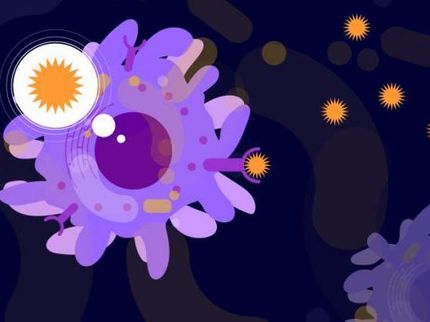Immune cells with a killer instinct
Tried-and-tested anti-tumour drug displays new effect
Advertisement
Imiquimod, a drug used to treat skin cancer, has been shown to have a previously unknown effect on immune cells. The drug transforms cells known as dendritic cells into "tumour killers" that attack the tumour directly and destroy its cells. The dendritic cells adopt an ingenious approach here - they not only produce special substances with a cell-damaging effect, they also manage to fight the tumour without the help of T and B cells and natural killer (NK) cells. This complex interaction was discovered by scientists participating in a doctoral programme of the Austrian Science Fund FWF. It was also recently published and commented on in the Journal of Clinical Investigation.
For 15 years now the drug Imiquimod has been authorised for the treatment of certain skin diseases, including some types of skin cancer. And during that period, the drug, which is administered as a skin cream, has proven to be an effective treatment. Despite this therapeutic success, the drug´s exact mechanism of action was not known to date. However, a research group working with Prof. Maria Sibilia, Head of the Institute for Cancer Research at the Medical University of Vienna, has now succeeded in determining some unknown and surprising effects of Imiquimod (Imi) on special immune cells.
Cellular infantry
In a mouse model for malignant melanoma, Prof. Sibilia and her team succeeded in demonstrating that Imiquimod not only triggers the "recruitment" of special immune cells, but also "arms" them for the battle against tumour cells. "We were able to show that Imi has an immediate and direct effect on mast cells in the skin. Mast cells are immune system cells that can release messenger substances for the control of an immune response. In reaction to Imi, which activates special receptors known as toll-like receptors, mast cells release CCL2 messenger substances - a starting signal that triggers a response with fatal consequences for tumour cells," explains Dr. Barbara Drobits, key scientist in the FWF-funded doctoral programme responsible for the discovery.
The group actually succeeded in demonstrating that CCL2 then causes the migration of additional immune system cells. The analysis of the subsequent activity of these immune cells generated a real surprise for the scientists: the immune cells, called plasmacytoid dendritic cells (pDCs), were considered to be modulators up to now. However, in their reaction to Imi, they proved to be bona fide aggressors.
Fighting strategy
Prof. Sibilia reports: "My team succeeded in decoding an important aspect of the mechanism of action triggered by Imiquimod and the role of the pDCs in this process. This is part of a complex strategy adopted by the body in the fight against tumours. pDCs were not only attracted by CCL2, but were also prompted to produce interferon alpha (IFN alpha) in response Imi." IFN alpha actually triggers the production of different substances (TRAIL, granzyme B) that can have a fatal effect on tumour cells. As another special characteristic, it was possible to show, for the first time, that pDCs themselves initiate the destruction of the tumour cells independent of the immune cells of the adaptive immune system (B and T cells) and without the help of NK cells, both of which are considered important components of the anti-tumoural immune response.
Overall, the team from the doctoral programme "Inflammation and Immunity" succeeded in discovering a new mechanism of action of dendritic cells in fighting tumours; it had never been possible before to observe such a direct attack on tumours by pDCs. Further studies will reveal the extent to which this discovery will benefit the development of innovative cancer therapies. Some important questions remain open, however, as Dr. Drobits explains: "It is known that some tumour cells produce CCL2 themselves. In other words, they should have triggered the same cascade as Imi. But this did not always result in a positive disease progression. We do not yet know why this is the case and it needs to be explained." In meeting challenges like this, the FWF´s doctoral programme once again proves that it is fulfilling an important goal: to give young scientists the opportunity to work at the vanguard of cutting-edge science.
















































